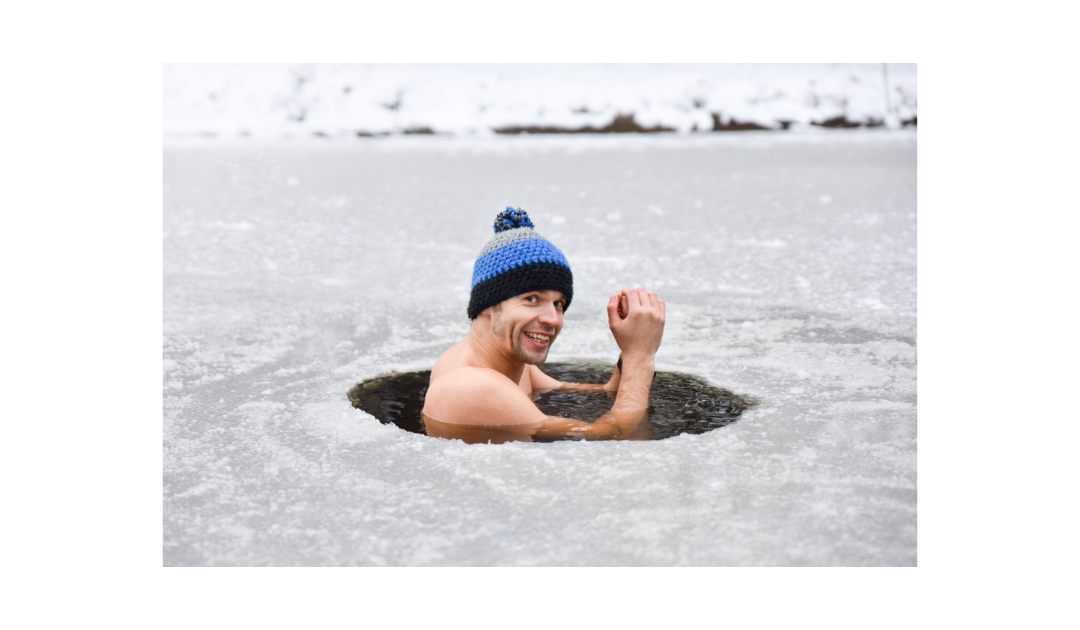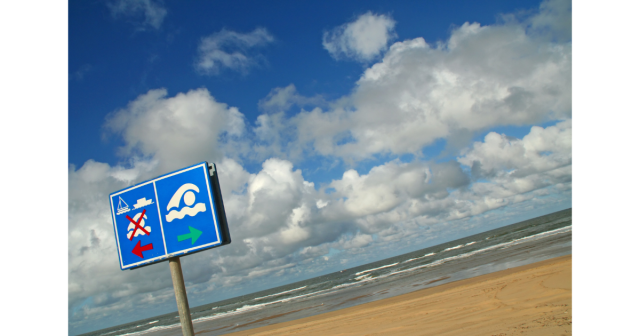Should you take the plunge?
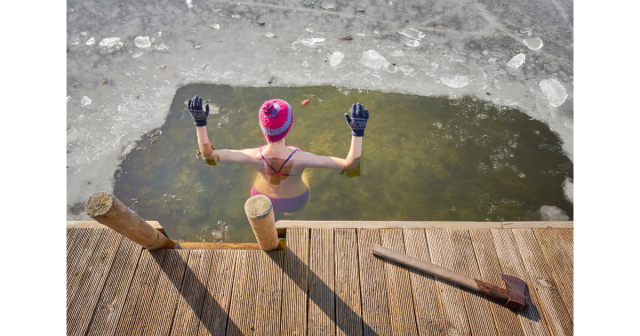
To voluntarily immerse yourself in freezing water might not be everybody’s cup of tea, but many athletes believe that cold water therapy post exercise relieves muscle soreness and speeds up recovery time (1).
Andy Murray (2) says of his ice bath routine, “Fortunately I’ve got used to plunging myself into ice-cold water and I don’t mind it.” Heptathlete Jessica Ennis-Hill (3) used to stand in a wheelie-bin full of icy water to aid recovery, while Paula Radcliffe (4) revealed, “I have now practised the treatment for five London marathons and the results are impressive, even if the process is enough to reduce you to a shivering wreck.”
The sporting achievements of these athletes suggests that ice baths are good therapy for muscle recovery – the cold water lowers the body temperature, making vessels constrict to reduce blood flow, which in turn reduces inflammation in the muscles. When you climb out of the bath, the blood flows back into the vessels, invigorating the muscles with oxygen and helping the cells to repair (4).
Placebo or not?
However it’s also argued that the icy dip gives rise to a mere placebo effect and actually inhibits, rather than aids, muscle recovery – by reducing blood flow and inflammation, it’s been found that muscle protein synthesis is slowed down.
Research carried out by the Queensland University of Technology (3) into the effect of ice baths, found them useful for a quick recovery between events at a tournament but not if you want to get muscles stronger in the long term and were no more effective than active recovery, where you continue to exercise at a low intensity. So, perhaps cold water therapy is useful in some situations, but the jury is out on its efficacy and if ever you need an excuse to avoid an ice-filled bath, you have it right there!
Other Benefits
But, before thinking you’re completely off the hook, do consider that there are other benefits to be had from cold water immersion. It has proven to be excellent therapy for depression, pain, migraine, post trauma recovery and is even said to have cured broken hearts!
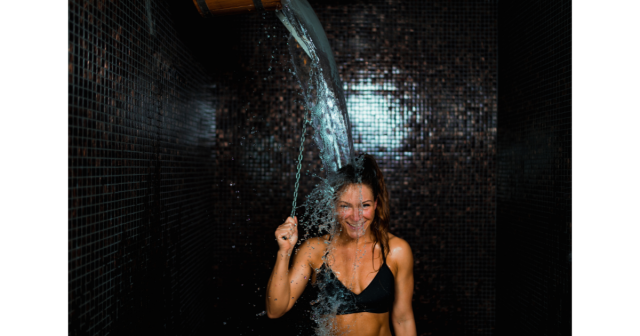
There are added health benefits to cold water therapy other than athletic performance
If an advert were needed for the positive benefits of cold water swimming, it would have to be the Netflix documentary ‘The Ponds’ (5) (6).
Filmed in 2018 at Hampstead Heath, swimmers of all ages and from all walks of life are united by their beaming smiles, the light shining from their eyes and a brimming confidence as they emerge from the water. The rush of endorphins is evident, the commitment by a hard core of swimmers to enter the water year-round is unwavering and their pride in how low a temperature they can bear is clear. Swimmers speak of their dependence on the ponds as an addiction, like coming there to worship, the spirituality of the place and sheer physical joy of being in the water. Like evangelists they proclaim, “You just feel really glad to be alive”, “I can face anything when I come out of the pond” and “A wonderful, wonderful feeling.” Many of the swimmers interviewed have had difficulties in their lives with both health and personal issues, and regular cold water swims have been their saviour.
Whilst there is plenty of anecdotal evidence about cold-water swimming lifting your mood, the first case report to provide evidence was published as recently as 2018, by The British Medical Journal (7). The subject, a 24 year old woman who suffered severe depression and anxiety, used cold water swimming as a treatment for a year and is now medication and symptom free.
If you adapt the body to the stress of a cold water shock, it will similarly be prepared for a stress response associated with depression and anxiety. When entering cold water the many cold receptors in the skin stimulate an avalanche of electrical impulses to the brain, signalling an outpouring of beta-endorphins and noradrenaline (8), as well as raising levels of dopamine. These are all feel-good chemicals and contribute to positive feelings. The rush of endorphins is also thought to give effective pain relief.
Cold Water Swimming
Cold water swimming, or wild swimming, isn’t a new craze at all. The ponds on Hampstead Heath have been swum in since the 1880s, with women allocated their own pond during the 1920s and, as wild swimming goes, they are probably one of the safest places to take the plunge, with lifeguards on hand and a tradition of rules. However the modern hobby of wild swimming throughout the UK really took off during the pandemic, when public pools were closed and cooped up people longed to commune with nature. Remember that first hot summer of lockdown when nothing could be more tempting than taking the plunge at a local wild swim spot and calling it your ‘one hour of exercise’? Outdoor Swimmer magazine reported an increased take-up of 94% between 2019 and 2020 (9).
You may already be a devotee and have your favourite place to swim. However, if you’re new to cold water swimming, there are a few things to think about before you take the plunge; whether it’s in the sea, a river, lake, pond, reservoir or even a local waterfall.
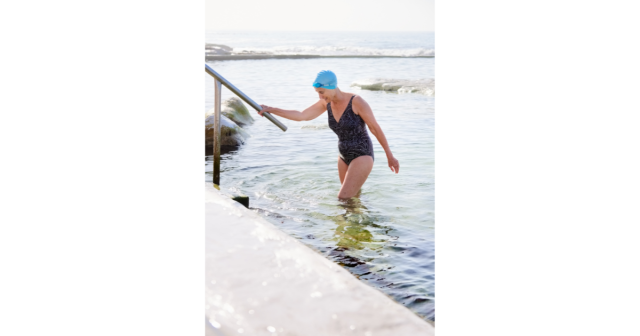
In the UK, water temperatures in the great outdoors can vary between 10-28ºC in the summer and 0-7ºC in the winter
Preparing To Take The Plunge
The Hampstead ponds’ lifeguards helpfully display the temperature on a board, so you know what’s in store, but elsewhere of course, you’re unlikely to have this intel.
The science behind how long it is beneficial for you to be immersed in cold water and at what temperature is unknown, but prolonged exposure is known to have an adverse effect. While it’s normal for your fingers and toes to feel numb as blood vessels restrict in the cold and then tingle as you warm up afterwards when the blood flows back, there are some people who suffer from ‘non-freezing cold injury’, where subsequent nerve and blood vessel damage can cause persistent pain and cold sensitivity.
A gradual strategy of acclimatisation is needed for anyone new to cold water swimming to protect against the risks. Those in good health who have become adapted to the shock of cold immersion over a period of time enjoy the benefits, however, it can endanger those who have not properly adapted to the environment (10). It’s also possible that those with unrecognised heart issues may be putting themselves at risk of arrhythmias by cold water immersion. It’s definitely worth going for a health check with your GP before taking up wild swimming.
There’s also the question of whether it’s advisable to dive straight into cold water or to get in slowly? The former minimises the apprehension and many of the swimmers at the Hampstead ponds seem to dive in, particularly the men who have the luxury of a board. Be aware though that you might have a cold water shock response (11), which is when the blood vessels restrict blood flow causing increased heart rate and higher blood pressure, and the sudden cooling of the skin causes an involuntary gasp for air and increased rate of breathing – all of this can contribute to a state of panic. The initial effects should recede and, if you are out of your depth you should stay calm and float on your back for a minute until the shock passes.
The Outdoor Swimming Society
The Outdoor Swimming Society recommends getting in gradually and staying where you can stand until the cold water shock response has passed and breathing is under control. They also say that if you stay in the cold water too long with your body continuing to lose heat, the blood will be rushing away from your muscles to keep your organs warm and you will lose power. A safe strategy is to stay close to shore and get out as soon as you feel your muscles not working as well.
Assuming you’ve ticked the health box, can’t wait to take the plunge, and you live nowhere near Hampstead Heath, you will want to find out where you can wild swim locally. The Outdoor Swimming Society has over 25,000 members and will enable you to connect with other like-minded people who can recommend nearby swim spots.
There are plenty of other websites too that will guide you to your own special swimming place including:
Cross-Country Swimming
For those wanting to take on a further challenge, the sport of cross-country swimming might ‘float your boat’, or more specifically ‘float your kit’, as you will pull it in a raft behind you (12).
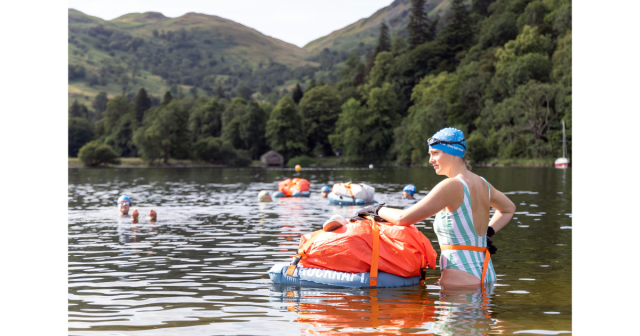
Cross-country swimming combines the joys of hiking with the invigorating thrills of wild swimming,
A company called Above Below co-founded by Tom Watt organises cross-country swimming events, provides equipment and shares routes. As he explains, “It’s a continuous journey over land and water taking all your kit with you. It combines the joys of hiking with the invigorating thrills of wild swimming.”
For complete beginners to this, it’s advisable to enlist a guide or go through a company that specialises in cross-country swimming so that you can learn how to forward plan a safe trip.
Key is Safety
Wherever you are wild swimming, especially when the water is cold, your key consideration must be your personal safety.
Remember to:
- Have a health check with your GP before taking up cold water swimming
- Avoid swimming alone and choose places where others swim, preferably where there is a lifeguard
- Remain in cold water for only a short period of time and exit before you experience numbness, pain or shivering.
- Be mindful of a ‘cold water response’ and rest for a minute after entering the water if affected
- Consider if there are tides, rip* tides, currents, waves or underwater obstacles, like rocks or debris. *Rips are strong currents running out to sea, which can take you out of your depth. They can be hard to spot, but look for a channel of churning, choppy water on the sea’s surface. If in doubt, swim in a lifeguarded area and ask for advice.
- Avoid areas you know to be polluted and avoid swimming near jellyfish
- Stay close to shore to allow rapid exit
- If the cold makes your muscles cramp, float on your back and call for help.
- Avoid jumping into or swimming near ice as it will cut you and you won’t be able to feel it due to the cold.
- Plan how you’re going to exit the water – your muscles won’t work as well when you’re cold and your hands and feet could be numb. Choose an exit that’s neither steep nor slippery.
- Plan how you’re going to get warm quickly afterwards – bring towels, a dry robe, dry warm clothes and a flask of hot drink. Make sure you are warm before attempting to drive or cycle.
References
2. https://www.bbc.co.uk/sport/tennis/40489130
3.https://www.bbc.com/future/article/20161209-do-athletes-need-to-take-ice-baths
4.https://www.standard.co.uk/escapist/health/brave-an-ice-bath-like-andy-murray-6761578.html
6.https://filmuforia.com/the-ponds-2018-2/
9.https://www.bbc.com/travel/article/20210603-why-wild-swimming-is-britains-new-craze
10.https://www.ncbi.nlm.nih.gov/pmc/articles/PMC7730683/
11.https://rnli.org/safety/know-the-risks/cold-water-shock
12.https://www.womenshealthmag.com/uk/fitness/a44408341/cross-country-swimming/

